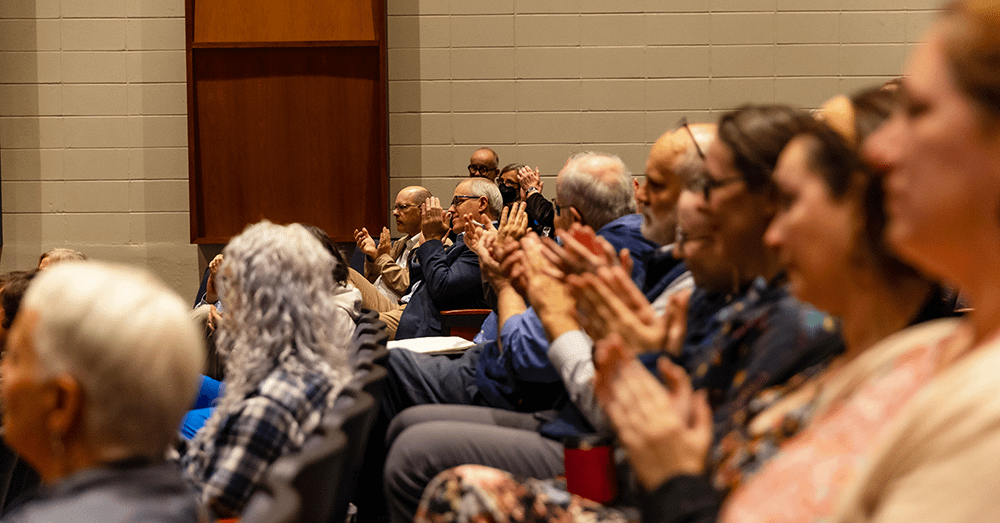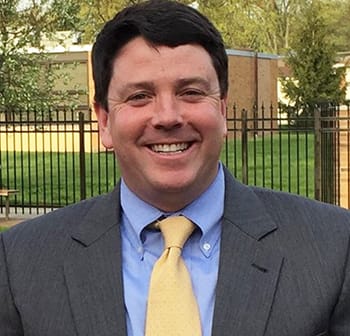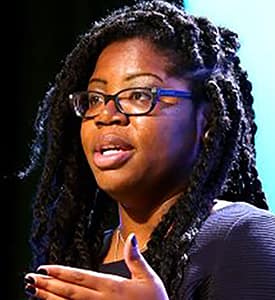O’Connell on board as resource, guide for veterans
“The world is just exciting — every part of it is exciting to me,” says Ken O’Connell.
The new coordinator of Student Veterans Services at Saint Michael’s College since April 4 brought that attitude to Army service as a communications specialist in Europe in the late 1980s. Now he’s finding it fully compatible with liberal arts education.
His outlook has allowed O’Connell the enviable experience of feeling like a kid in a candy store most days of his life. Not yet 50, he already has had productive turns as a soldier, first-grade teacher and school enrichment coordinator, photographer, active community supporter and family man – the last three ongoing in his present home of Essex Junction, where he lives with his wife, Jaye, along with two sons, ages 21 and 18, and a daughter in middle school.
O’Connell wants to help fellow veterans acquire the tools for fulfilling futures by connecting them with a Saint Michael’s education. He’s spent this past spring and summer getting to know incoming students who are veterans, along with other Saint Michael’s people. He’s also been networking beyond campus and helping with relocation of the Student Veterans Services office from Alliot Hall to Klein Hall, where he’ll work alongside Career Services and other offices that he considers to be natural partners in helping veterans.
Already he has participated in a program for alumni veterans at the College’s June Reunion Weekend, helped local veterans connect to students, faculty and staff in the College’s organic garden, brought area veterans to campus for Wellness Training in partnership with neighboring colleges, and forged working ties with the Admission office.
O’Connell says positive thinking took root for him as a native Vermont kid growing up in Middlebury. He loved to tinker with cars and gadgets and was a natural at fixing and figuring them out. He always felt prepared to tackle any situation with a “can-do” attitude passed along by his industrial-arts teacher dad and insurance-agent mom.
But by senior year in high school O’Connell realized that while he was smart, curious and capable, he was a hands-on learner more than a books-and-tests guy. The Army, with its “Be all that You Can Be” ads of that era, seemed a good way to see the world, learn advanced skills and pay for future college.
So he set aside thoughts of a cross-country bike trip with a pal or becoming a disc jockey and. instead made a trip to a Burlington Army recruiter, leading in short order to basic training in South Carolina. O’Connell thrived there. He welcomed the structure, discipline, camaraderie and supportive team that the Army introduced to his life. From there, it was specialized training for communications and a posting to Germany. By the time of his discharge in 1988, he had experienced Europe’s cultural riches, won commendation for notable achievement during NATO operations with the 43rd Air Defense Artillery, acquired useful technical skills and was feeling ready to attend college.
O’Connell says he understands from his own transition back to civilian life that “every veteran is an individual” with a broad range of experiences and adjustments to make — many of those different and perhaps more challenging than what he experienced, particularly for those returning from combat zones likes Iraq or Afghanistan.
Yet veterans of all backgrounds typically find common ground, he says, and tend to help one another even after the service. “The military made me realize I don’t have to do it by myself,” he says. “I appreciated being part of a group that I trust, working all together to complete a mission.” He envisions a comparable dynamic in his work with student veterans or those from military families or the Guard, and also working among supportive staff and faculty teammates.
“One thing I’m finding by talking to folks here and the new veterans I’m meeting is that trust is often really hard – it made me remember when I got out, and how you feel almost alone – you’re thinking, ‘I had all these supports in the military, and now what?’”
O’Connell says he transitioned back to college by taking a few basic classes at CCV while working road construction or wait-staff jobs, before entering an elementary education program at UVM. He says veterans are used to being busy all day and typically welcome challenges, though he cautions them against “burning out” by trying to do both school and one or two jobs all at once.
“What I hope to do here is create that trust when I meet people for the first time and show them what we have here, show them around campus — most likely one-on-one instead of in a whole group,” says O’Connell, who feels the standard Admissions tour for traditional applicants might not resonate with older and more worldly veterans.
This is where his experience as an educator will be useful, he says. As a public-school first-grade teacher and later an enrichment coordinator in Underhill from 1996 to 2006, O’Connell grew confident in his abilities to be a “resource and adviser” for different learning styles and personalities.
“In elementary school, everything was new for students, and that’s how my mind works,” he says. “In my last school job I was differentiating instruction for individuals, and that’s what this veterans job needs in a sense: identifying for individuals what their needs are — social needs as well as educational needs – while maybe giving support to faculty and finding the needed resources.”
It’s important, he thinks, to connect St. Mike’s veterans with resources beyond campus too, so O’Connell has started working with Joshua Gerasimof at Veterans Affairs in Burlington, with the Vermont State Colleges system, Veterans Upward Bound and Adaptive Sports. Making veterans aware of all benefits available to them, whether through the GI Bill or other avenues, is a priority for him.
He also wants to be “a point of contact for anybody who’s military affiliated – spouses, Guard members, children of vets — and make sure they’re directed to me when expressing interest so I can make personal connections.” He’s excited about technology that will allow him to speak to prospects worldwide who still might be serving as they plan ahead. He intends to join admissions staff on travel this fall and is aiming to visit bases or successful nearby veterans program along with college fairs in those areas he visits.
His new Klein office, which he’s thinking of calling a “Military Family Resource Lab,” is equipped already with couches and computer terminals. He wants it to be a place where veterans can gather to build comfort, trust and support among themselves.
O’Connell’s to-do list also includes expanding links to nearby Camp Johnson: “Air and National Guard bases are a huge asset, and I hope to connect with the education commands and outreach personnel soon and maybe bring back the on-base classes if we find a need,” he says. O’Connell also hopes to offer “military awareness training” for faculty and staff in coordination with the VA.
He has enjoyed learning about the College’s rich military heritage, which has produced such figures as the late Medal of Honor recipient Col. Donald Cook ’56 and the present chairman of the Joint Chiefs of Staff, Marine General Joseph Dunford ’77. “Father Ray [Doherty ’51] has been a great support on the history of the school and connections in the community,” O’Connell said of the popular Marine-veteran Edmundite campus priest.
Besides skiing and other sports, O’Connell has a lifetime deep interest in photography as a hobby and side business – particularly infrared images. In Essex Junction he has been involved in downtown revitalization and served on the Farmer’s Market Board. “I think active community members are really important to create the community you want to live in,” he says.





